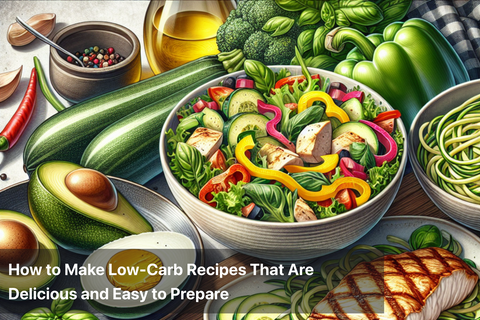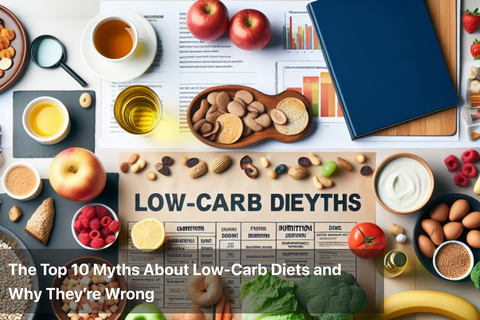
The Impact of a Low-Carb Diet on Skin Health
Healthy skin is more than just surface-level beauty—it's a reflection of overall internal health. Skin conditions like acne, rosacea, dryness, or eczema are often influenced by hormonal imbalances, inflammation, oxidative stress, and dietary choices. As awareness grows around food’s role in skin wellness, many are turning to low-carb diets not just for weight management or blood sugar control, but also for their potential to improve skin clarity, texture, and tone.
A low-carb diet typically reduces sugar and refined carbohydrate intake while emphasizing whole foods, protein, healthy fats, and vegetables. Since many skin issues stem from blood sugar imbalances, inflammation, and hormonal shifts, the dietary changes associated with low-carb eating can have a transformative impact on skin health.

How Diet Affects Skin Health
The skin is a dynamic organ constantly regenerating and reacting to internal and external stimuli. Diet is a powerful internal factor, and consuming processed foods, refined sugars, and simple carbohydrates can negatively influence skin by:
-
Increasing sebum production
-
Triggering inflammatory pathways
-
Disrupting insulin levels and hormones
-
Encouraging glycation (where sugars bind to collagen and reduce skin elasticity)
By limiting high-glycemic foods, a low-carb approach helps minimize these effects and supports clearer, more resilient skin.
Causes of Diet-Related Skin Issues
Several factors connect poor skin health to dietary imbalances. Common triggers include:
-
Blood Sugar Spikes: High-glycemic foods lead to insulin surges, which can boost oil production and clog pores.
-
Chronic Inflammation: Diets rich in sugar and omega-6 fats promote inflammation that worsens skin disorders.
-
Hormonal Imbalance: Insulin resistance affects other hormones like androgens, leading to acne and breakouts.
-
Oxidative Stress: Nutrient-deficient processed foods reduce antioxidant levels, weakening the skin’s protective barrier.
-
Poor Gut Health: A disrupted microbiome can influence systemic inflammation, leading to skin sensitivity and flare-ups.
Skin Conditions That May Improve with a Low-Carb Diet
|
Skin Condition |
Connection to Diet |
How Low-Carb Helps |
|---|---|---|
|
Acne |
Linked to high insulin and androgen levels |
Stabilizes insulin, reduces sebum production |
|
Eczema |
Inflammatory triggers, gut-skin axis imbalance |
Reduces inflammatory foods, supports gut health |
|
Psoriasis |
Autoimmune and inflammation-driven |
Minimizes flare-up triggers |
|
Rosacea |
Aggravated by sugar, dairy, alcohol |
Low-carb often reduces these irritants |
|
Premature Aging |
Caused by glycation of collagen and elastin |
Lowers sugar intake, preserves skin elasticity |
Nutrients in Low-Carb Diets That Support Skin Health
Low-carb diets that are rich in whole, nutrient-dense foods offer a variety of compounds essential for skin regeneration and protection:
-
Omega-3 Fatty Acids: Found in flaxseeds, walnuts, and fatty fish, these fats reduce inflammation and support the skin’s lipid barrier.
-
Vitamin A: Present in egg yolks and leafy greens, it aids in skin cell turnover and acne prevention.
-
Zinc: Found in seeds, nuts, and seafood, it helps repair damaged tissues and control oil production.
-
Collagen Precursors: Amino acids from protein-rich foods like eggs, poultry, and paneer support skin structure and elasticity.
-
Antioxidants: Leafy greens, berries (in moderation), and herbs offer protection against oxidative damage.
Symptoms That May Signal Dietary Impact on Skin
Skin often acts as a mirror for internal issues. Certain symptoms may suggest that dietary choices are affecting skin health, either positively or negatively.
-
Frequent breakouts: May be linked to insulin surges and processed food intake
-
Dry, flaky skin: Could indicate insufficient healthy fats or dehydration
-
Redness and inflammation: Often a result of inflammatory foods or gut imbalance
-
Dark under-eye circles: Linked to poor digestion or food sensitivities
-
Dull skin tone: Suggests lack of antioxidant-rich vegetables and hydration
Sample Skin-Supportive Low-Carb Meal Plan
|
Meal |
Foods Included |
|---|---|
|
Breakfast |
Scrambled eggs with spinach, avocado slices, herbal tea |
|
Lunch |
Grilled paneer salad with olive oil dressing, nuts |
|
Snack |
Handful of walnuts or roasted seeds |
|
Dinner |
Stir-fried chicken with zucchini, garlic, and herbs |
|
Hydration |
Water with lemon, green tea, or mint-infused water |
Lifestyle and Hormonal Considerations
Clear skin isn't just about food—it’s also affected by hormones, sleep, stress, and lifestyle choices. Chronic stress elevates cortisol levels, which can worsen acne and eczema. Inadequate sleep impairs skin regeneration, while lack of movement slows circulation and detoxification. Combining a low-carb diet with daily movement, stress management practices like meditation or yoga, and 7–8 hours of quality sleep each night amplifies skin benefits.
When Skin Gets Worse Before It Gets Better
Some people experience a temporary "purge" or skin breakout shortly after switching to a low-carb diet. This can result from:
-
Toxin release: As the body detoxifies from processed foods and sugar
-
Hormonal adjustment: Lower insulin levels may temporarily shift other hormones
-
Keto flu symptoms: Temporary dehydration or electrolyte imbalance can cause dryness or dullness
These effects are usually short-lived and resolve as the body stabilizes.

Precautions and Who Should Be Cautious
Not every low-carb diet is skin-friendly. Going too low in carbs or relying on processed “keto” products can backfire.
-
Avoid nutrient gaps: Ensure adequate intake of vitamins A, C, E, and essential fatty acids
-
Don’t skimp on fiber: Low-carb should not mean low-fiber. Include vegetables, seeds, and moderate berries
-
Hydrate consistently: Skin hydration depends heavily on water intake and electrolytes
-
Watch protein sources: Avoid excess processed meats which may contain additives that worsen skin conditions
-
Monitor hormonal changes: Women with hormone-sensitive skin conditions may need to adjust carb intake cyclically
Summary
A well-formulated low-carb diet can play a pivotal role in supporting healthy, radiant skin. By reducing inflammatory foods, balancing blood sugar, and encouraging nutrient-rich whole foods, this dietary pattern helps address the root causes of many skin issues. Whether you're dealing with acne, eczema, or simply looking to glow from within, the quality of your food matters just as much as your skincare routine.
Lofoods makes it easier to nourish your body and skin with wholesome, low-carb options crafted for real-life wellness. The journey to clearer, healthier skin begins with what’s on your plate—and every skin-loving meal is a step toward long-lasting beauty and confidence.
This Blog post is an initiative by Lo! Foods, to provide accurate and Nutritionist / Doctor approved information related to Health. Lo! Foods is India's leading brand for Everyday Functional Foods. Foods designed for specific Health conditions or Needs. Lo! Foods also runs India's largest range of Low Carb Healthy Cloud Kitchens, under the brand names of Lo!, ProteinChef, ATH (All Things Healthy) and DiabeSmart.













Leave a comment
Your email address will not be published.